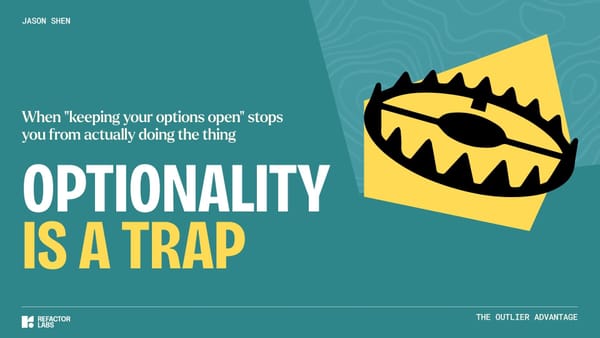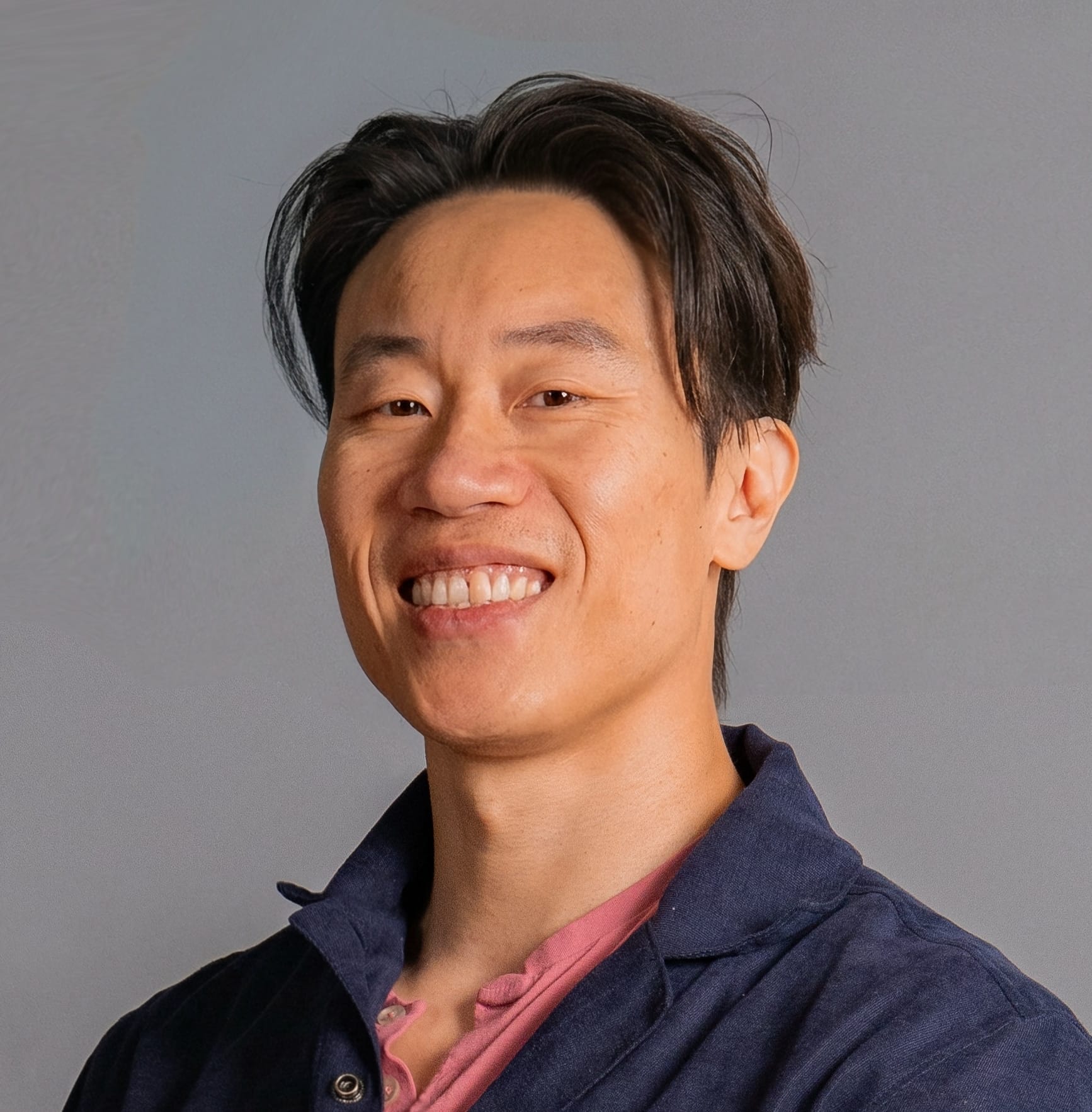
280: Optionality Is a Trap
When "keeping your options open" stops you from actually doing the thing
You finally quit your job. After months of spreadsheet planning and long conversations with friends and mentors you decided it was time for to create space for something new.
You were ready. You handed in your notice. You got out.
Except you didn't, not really. Your manager talked you into a different arrangement. You're technically on leave, not gone. You still have the badge, the email, the Slack.
And the fact that you've left the door open, both psychologically and financially, makes going back easier. Part of you is still protecting your downside risk.
I've seen a version of this scenario come up multiple times in my coaching practice and among my peers.
There's always a good reason. Maybe it was to let down the company slowly. Maybe you'd decide that things weren't so bad after all. Maybe the new adventure wouldn't turn out the way you expected. Why burn a bridge unnecessarily?
But there's a trap that a particular segment of highly achiever is at risk of falling into. The thing we've all been trained to do our entire lives. Optimizing for optionality.
How We Got Here
When I was in college nearly two decades ago, biology / human biology, and economics were the two most popular majors. They created optionality.
Economics enabled you to go into a lot of different fields—business, consulting, finance, law, or something else.
Biology and human biology were typically considered premed majors, but still opened doors to research, public health, and plenty of other non medical fields.
After graduation you looked to your first job to create more options. Maybe it was Teach for America, a post-grad fellowship, consulting or investment banking - all super competitive opportunities where you could work really hard for two years, gain a ton of experience and practical skills, usually make a good chunk of money, and then have the opportunity to do something else.
More recently, it's probably been going work for one of the big tech or AI companies to get an impressive stamp on your resume, earn lucrative stock options, and again, give yourself more career options.
The whole idea of optionality is that you want to make choices that preserve options, that give you the widest degree of freedom even after having chosen. Because choosing is constricting. It puts constraints on you, and if you're constrained, then you can no longer choose things that might be what you want or would be ideally better for you.
Optionality provides a lot of benefits, making sure you don't commit early on to a path that is too limiting, too constraining.
But at some point, optionality stops being an asset. At some point, choosing the path that creates more options, more opportunities, actually leads to less.
The Optionality Trap
I see this with my startup founder clients who are pursuing new ideas or trying to pivot their company. It's very hard for them to commit because they're afraid of being wrong and of going down a path that will take a long time to reverse. They're afraid that they will choose wrong.
I had a mentor who was a White House Fellow - one of the most prestigious leadership programs in the country. He told me that some of the people who did that program would probably look back and think that being a White House Fellow was the greatest achievement about their life.
"And if that's the case, you've failed. And the program failed," he said, pointing his finger at me dramatically. "The fellowship was supposed to expose you to extremely senior leaders, so that you'd go on to do bigger and better things. But some of them never do."
That's the trap. These people collected the credential and stopped. They'd spent so much energy acquiring options that they never actually converted them into anything else.
It's like somebody who saves and saves and saves their whole life and then never spends their money. At some point, you have to ask: what was the point of doing that? All of that work was wasted.
Why We Can't Commit
So why don't we commit? What's really holding us back?
You scroll through social media and see a ton of people succeeding in something. You think: what am I doing wrong? Maybe I need to make a different choice.
What you forget is that those success stories happened because the people involved committed to something a long time ago and now it's all finally paying off. You're seeing the outcome, not the years of quiet, uncelebrated work that came before.
But beyond FOMO, there's something else. When you choose something that preserves optionality—joining a prestigious company, studying a popular major—people understand. They nod. "Smart move."
But when you choose something more narrow, more esoteric, but more in line with your interests and tastes - people question your judgment. They don't get it. And you're afraid that even before you fail or succeed, people will look at you differently.
And then there's the big one: what if you commit to a path, an idea, a person and then realize, oh actually, I should have taken Option B? You'll feel like a fool.
These fears are real and that's why this is hard. But allow those fears to shape your behavior and continuing to optimize for optionality eventually becomes worse than the thing you were afraid of.
The Relationship Test
We all know that optionality eventually fails in the realm of dating and relationships.
You can be talking to a couple people for a while, keeping your options open, but you just won't (poly folks aside) have that deeper level of intimacy and trust and connection that you do once you actually commit to somebody. And then you know, maybe marry them.
The constraint - committing to one person - is precisely what enables the depth you're actually craving. It's what allows us to be vulnerable with someone, allow them to see who we are.
When we both commit, we shield ourselves from leaving at the first sign of trouble. We don't have any other easy options so we need to make this big choice we made work. Marriage vows are a form of burning the boats.
But somehow, we're forget all this when it comes to our professional lives.
We tell ourselves we're "being smart" by keeping options open in our work. But what we're really doing is preventing ourselves from building anything real. From going deep enough to create something that matters. From developing the kind of expertise that only comes from years of sustained commitment.
You can't do that while also maintaining three other career paths "just in case."
Commitment is Underrated
If you recognize yourself in piece, good. But to be clear, I'm not saying to commit to your current or immediate next option.
But what needs to change is your relationship with commitment and constraints. You have to stop seeing commitment as largely negative. Because there are serious downsides to too much optionality.
Eventually, you will want to be an expert in a particular topic. You want start a company that solves a particular problem. Build a brand that stands for a particular idea.
Commitment is actually the ultimate goal. It's what you should be building towards.
The world is a complex, ever changing place. It is impossible to have all the facts of the present and knowledge of the future when making a choice. At some point, you'll have all the information you can reasonably get about the situation and your preferences. At some point, not committing becomes worse than choosing wrong.
Because when you actually choose, you get information you wouldn't otherwise have. When you finally double down on a market segment and stop exploring the others, you actually learn more than you would have if you continued your shallow investigation.
When studying for a test, the way to learn is not to just review your notes and think "This all seems familiar, I've got it." It's actually to test yourself with sample questions or flash cards.
Because forcing yourself to recall generates the learning. And making a mistake and seeing it corrected is vastly effective in learning than just looking at the right answer.
The same is true for your life. If you never commit, you never really make enough mistakes to learn from them. Better to make more mistakes, learn from them, and keep moving forward.
Putting it into Practice
So practically speaking, what does this look like?
First, decide if you're genuinely exploring or just hedging. If you're early in your career or a new domain, exploration makes sense. But give yourself a deadline. Set real checkmarks where you'll actually make a decision.
Second, close doors. Once you have enough certainty, stop leaving escape routes open. End the sabbatical. Turn in the badge. Stop applying to roles you know aren't right. Make the new thing the only thing.
Third, stop consuming. Every article about hot sectors or smart career moves reopens doors you've already closed. At some point, you need to stop taking in new information and start acting on what you already know.
To be clear: if you're early in your career, or early in exploring a new field or new area, it's okay to explore some optionality. But if you've been in your field for more than a little while, it's time to reconsider how much you keep your options open.
All that optionality you've created for yourself - the credentials, the network, the skills - it's like pushing a ball up hill. You're creating potential energy that eventually converts into something kinetic - into a real commitment that creates real outcomes.
But potential energy that never gets released? That's just a ball sitting at the top of a hill. At some point, you have to release the ball so it can go downhill and go somewhere.
The question isn't whether you'll eventually commit. It's whether you'll do it while you still have time to build something significant. Better to swing hard and strike out than never step up to bat.
